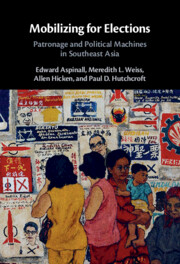Refine search
Actions for selected content:
45 results
4 - Second Prize Is a Set of Steak Knives
-
- Book:
- Dominance Through Division
- Published online:
- 01 March 2025
- Print publication:
- 06 March 2025, pp 108-136
-
- Chapter
- Export citation
9 - Conclusion
-
- Book:
- Dominance Through Division
- Published online:
- 01 March 2025
- Print publication:
- 06 March 2025, pp 311-320
-
- Chapter
- Export citation
1 - Introduction
-
- Book:
- Dominance Through Division
- Published online:
- 01 March 2025
- Print publication:
- 06 March 2025, pp 1-23
-
- Chapter
- Export citation
3 - A Theory of Group-Based Clientelism
-
- Book:
- Dominance Through Division
- Published online:
- 01 March 2025
- Print publication:
- 06 March 2025, pp 73-107
-
- Chapter
- Export citation
2 - The Enduring Success of Japan’s Liberal Democratic Party
-
- Book:
- Dominance Through Division
- Published online:
- 01 March 2025
- Print publication:
- 06 March 2025, pp 24-72
-
- Chapter
- Export citation
6 - How Politicians Tie Money to Electoral Support
-
- Book:
- Dominance Through Division
- Published online:
- 01 March 2025
- Print publication:
- 06 March 2025, pp 173-232
-
- Chapter
- Export citation
The Machine Works: Why Turnout Buying is More Effective Than it Appears
-
- Journal:
- British Journal of Political Science / Volume 55 / 2025
- Published online by Cambridge University Press:
- 12 February 2025, e13
-
- Article
-
- You have access
- Open access
- HTML
- Export citation
Votes Can Be Confidently Bought in Some Ranked Ballot Elections, and What to Do about It
-
- Journal:
- Political Analysis / Volume 32 / Issue 4 / October 2024
- Published online by Cambridge University Press:
- 06 May 2024, pp. 463-475
-
- Article
- Export citation
Poverty, Partisanship, and Vote Buying in Latin America
-
- Journal:
- Latin American Politics and Society / Volume 65 / Issue 3 / August 2023
- Published online by Cambridge University Press:
- 26 May 2023, pp. 1-19
-
- Article
-
- You have access
- Open access
- HTML
- Export citation
Weapons of Clients: Why Do Voters Support Bad Patrons? Ethnographic Evidence from Rural Brazil
-
- Journal:
- Latin American Politics and Society / Volume 65 / Issue 1 / February 2023
- Published online by Cambridge University Press:
- 22 December 2022, pp. 22-46
-
- Article
- Export citation
International Clientelistic Networks: The Case of Venezuela at the United Nations General Assembly, 1999–2015
-
- Journal:
- Latin American Politics and Society / Volume 64 / Issue 3 / August 2022
- Published online by Cambridge University Press:
- 21 October 2022, pp. 37-66
-
- Article
- Export citation
Vote markets, democracy and relational egalitarianism
-
- Journal:
- Economics & Philosophy / Volume 39 / Issue 3 / November 2023
- Published online by Cambridge University Press:
- 15 August 2022, pp. 373-394
-
- Article
- Export citation
9 - Conclusion
-
- Book:
- Mobilizing for Elections
- Published online:
- 04 August 2022
- Print publication:
- 11 August 2022, pp 235-256
-
- Chapter
- Export citation
4 - Targeting Individuals: Don’t You Forget about Me
-
- Book:
- Mobilizing for Elections
- Published online:
- 04 August 2022
- Print publication:
- 11 August 2022, pp 99-124
-
- Chapter
- Export citation
2 - Historical and Institutional Foundations
-
- Book:
- Mobilizing for Elections
- Published online:
- 04 August 2022
- Print publication:
- 11 August 2022, pp 31-66
-
- Chapter
- Export citation
1 - Patronage and Political Machines in Southeast Asia
-
- Book:
- Mobilizing for Elections
- Published online:
- 04 August 2022
- Print publication:
- 11 August 2022, pp 1-30
-
- Chapter
- Export citation

Mobilizing for Elections
- Patronage and Political Machines in Southeast Asia
-
- Published online:
- 04 August 2022
- Print publication:
- 11 August 2022
7 - Winning General Elections
-
- Book:
- Activist Origins of Political Ambition
- Published online:
- 08 July 2022
- Print publication:
- 21 July 2022, pp 185-204
-
- Chapter
- Export citation
9 - Contesting for Power
-
- Book:
- Soro Soke
- Published online:
- 23 May 2022
- Print publication:
- 26 May 2022, pp 121-137
-
- Chapter
-
- You have access
- Open access
- HTML
- Export citation
9 - Contesting for Power
-
- Book:
- Soro Soke
- Published online:
- 23 May 2022
- Print publication:
- 26 May 2022, pp 121-137
-
- Chapter
-
- You have access
- Open access
- Export citation
